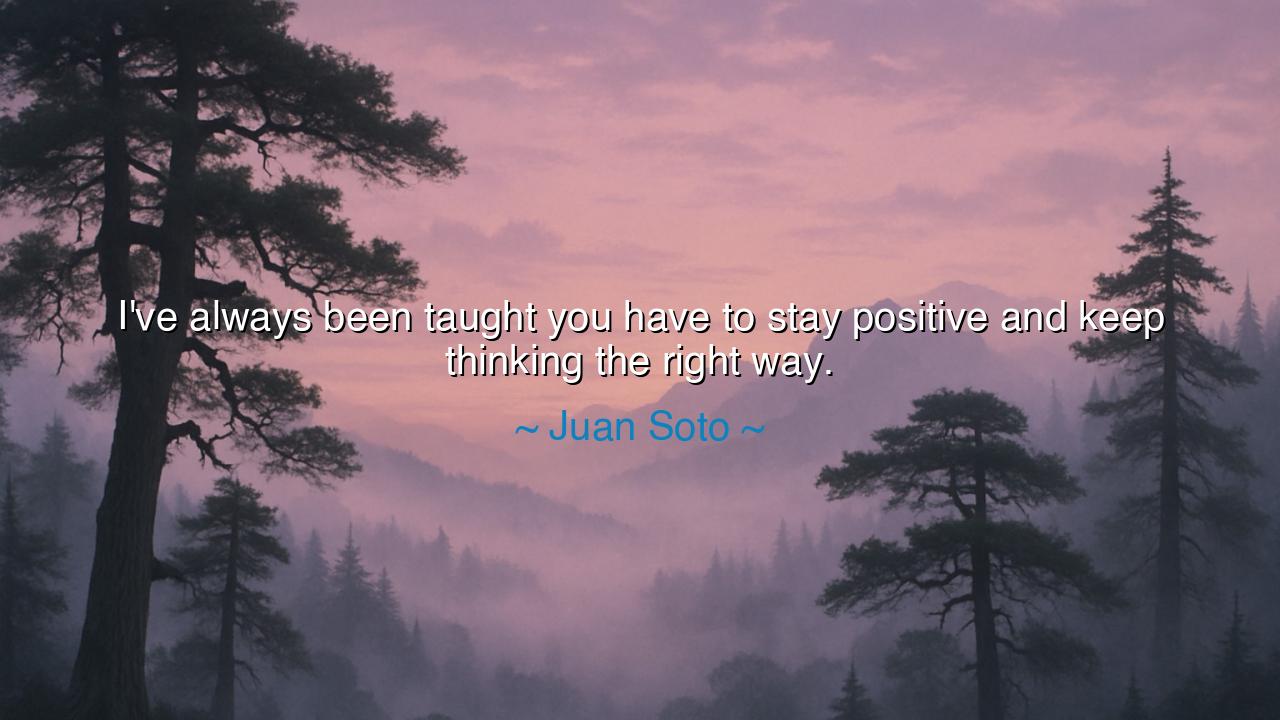
I've always been taught you have to stay positive and keep






The words of Juan Soto—“I’ve always been taught you have to stay positive and keep thinking the right way.”—shine with the clarity of a principle handed down through generations, like a torch passed from parent to child, from mentor to disciple. They speak not only of personal discipline, but of a philosophy of life: that the mind is the wellspring from which all deeds flow, and that to guard one’s thoughts with positivity and truth is to set the course of destiny itself.
From the dawn of human wisdom, this teaching has been known. The Stoics of Rome taught that we cannot govern the winds of fate, but we can govern the ship of our mind. The Buddhists of the East declared that right thought is the foundation of the noble path. To stay positive and to think the right way is no small command—it is the essence of self-mastery. For the world will bring setbacks, critics, and failures, yet the man whose thoughts remain steady like a mountain cannot be moved.
History shows us the power of such a mindset. Consider Nelson Mandela, who endured twenty-seven years in prison, cut off from the freedom he longed for. He could have surrendered to despair, yet he chose instead to stay positive and to think the right way. He nurtured forgiveness rather than hatred, vision rather than despair. When at last he walked free, he carried not bitterness but hope, and with it he reshaped a nation. His life proves the truth Soto proclaims: the mind, when disciplined, is stronger than chains.
Soto’s words also reflect the discipline of the athlete, where failure and success walk hand in hand. In baseball, as in life, even the greatest will stumble more often than they succeed. The difference between the defeated and the triumphant lies not in their failures, but in how they respond to them. To dwell in negativity is to sink further; to remain positive and aligned with “the right way” is to rise again, stronger and wiser. In sport, as in the journey of life, thought is as important as skill, and mindset as powerful as muscle.
To stay positive is not to deny hardship, but to choose courage instead of despair. To think the right way is not simply to dream, but to focus the mind on truth, discipline, and purpose. This is the warrior’s path, the scholar’s path, the artist’s path. It is the practice of directing the inner voice toward light, even when surrounded by darkness. The ancients would call this virtue; today we may call it resilience. But the essence is the same: thought shapes reality, and those who guide their thoughts wisely shape a noble life.
The lesson for us is this: train your mind as you would your body. Feed it not with bitterness, but with gratitude; not with fear, but with vision. In moments of defeat, choose to reflect, learn, and move forward. In moments of triumph, remain humble and focused. Surround yourself with teachers, friends, and voices that remind you to “stay positive” and “think the right way,” for even the strongest are shaped by the company they keep.
So, dear listener, let Soto’s words be written upon your heart. Make your mind a fortress of light, where positivity and right thinking guard the gates. When storms arise, stand firm; when failures come, learn and rise again; when victories arrive, use them to inspire others. For in the end, the greatest triumph is not found in wealth or glory, but in the mastery of the self. And this mastery begins with the daily choice to stay positive and keep thinking the right way.






HTNguyen Le Hoai Thuong
I find this statement motivating but also thought-provoking in terms of psychological impact. Does maintaining a constant focus on positivity risk creating pressure to suppress normal emotions like frustration or fear? How do athletes balance the mental demands of optimism with the need to process mistakes or setbacks honestly? I’m curious whether long-term adherence to positive thinking correlates with better performance, well-being, or both.
HVDào Hòng Van
This quote raises interesting questions about the role of upbringing and mentorship. If Soto was taught to stay positive and think correctly, how much does guidance from family, coaches, or mentors shape resilience and performance? Could someone who isn’t taught this early in life achieve the same mindset later through conscious effort? It also makes me reflect on the balance between positivity and realism in goal-setting and decision-making.
TPle tien phuong
Reading this, I feel inspired by the discipline implied in maintaining a positive outlook. How much of success in sports or life depends on mental attitude versus talent, preparation, or opportunity? I’m curious if there are strategies athletes like Soto use to cultivate positivity consistently, such as visualization, affirmations, or mindfulness practices, and how those could be applied in other fields beyond athletics.
HAHo An
I find this perspective encouraging because it emphasizes mindset as a key to success. I wonder, though, how realistic it is to always ‘stay positive and think the right way,’ especially during setbacks or high-pressure situations. Does this mindset require conscious practice like a skill, or is it more about innate temperament? I also question whether focusing too much on positive thinking could sometimes prevent addressing underlying problems effectively.